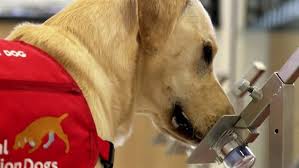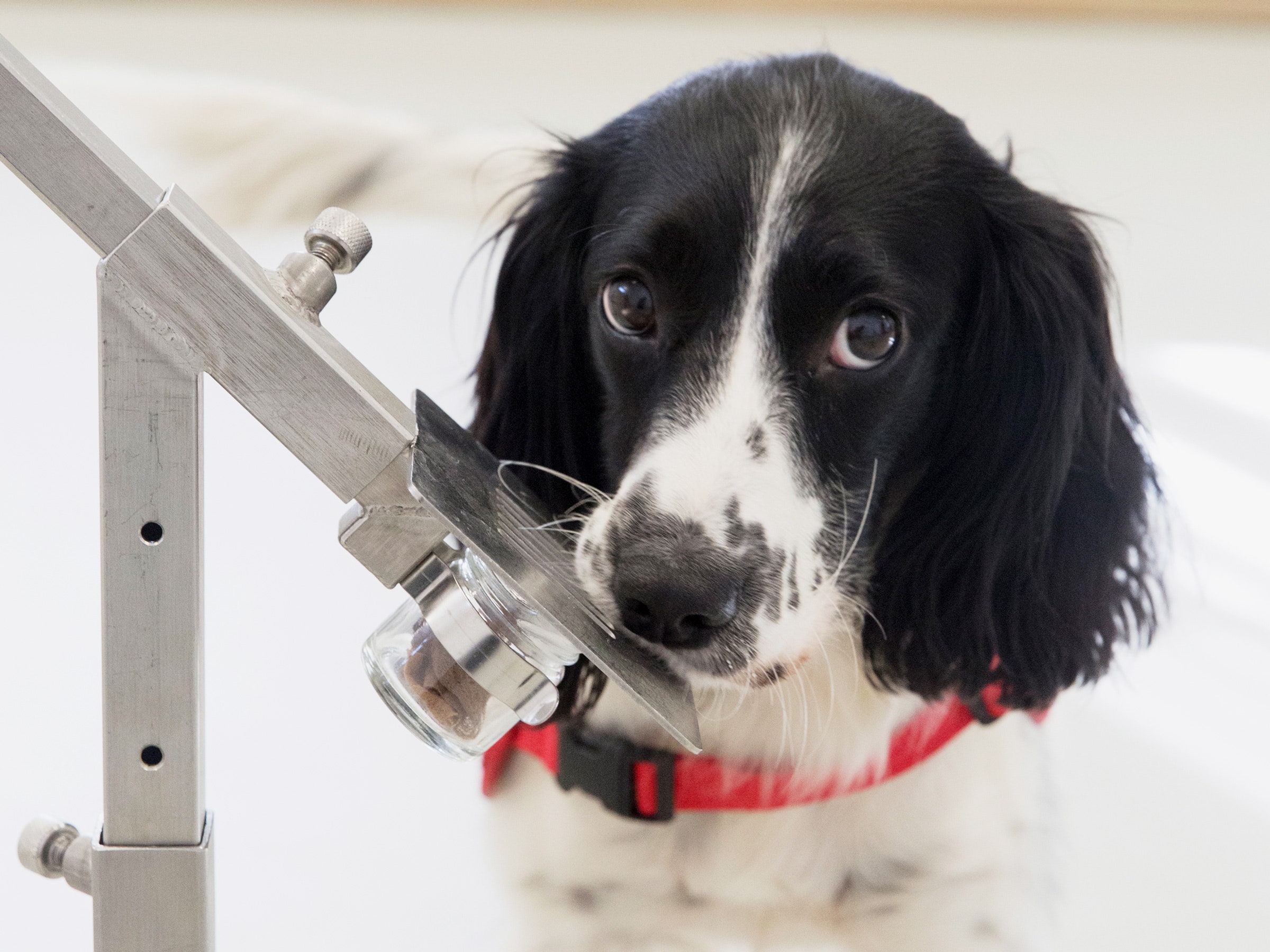
- Inspiring People -
- 8mins -
- 238 views
Cold, wet noses against coronavirus: COVID-19 detection dogs trial launched in the UK
Trials for specially-trained ‘COVID dogs’ that may be able to detect the coronavirus (COVID-19) in humans, even before symptoms appear, are set to begin as part of new research, says govt.
UK launches covid-19 detection dog trials
“COVID dogs” are to be trialled as a potential non-invasive detection approach for the virus in the future. The bio-detection dogs, who successfully detect certain cancers, will undergo intensive training to see if they can spot coronavirus before symptoms appear. The clinical trial is backed by half a million pounds of government funding for innovative schemes.
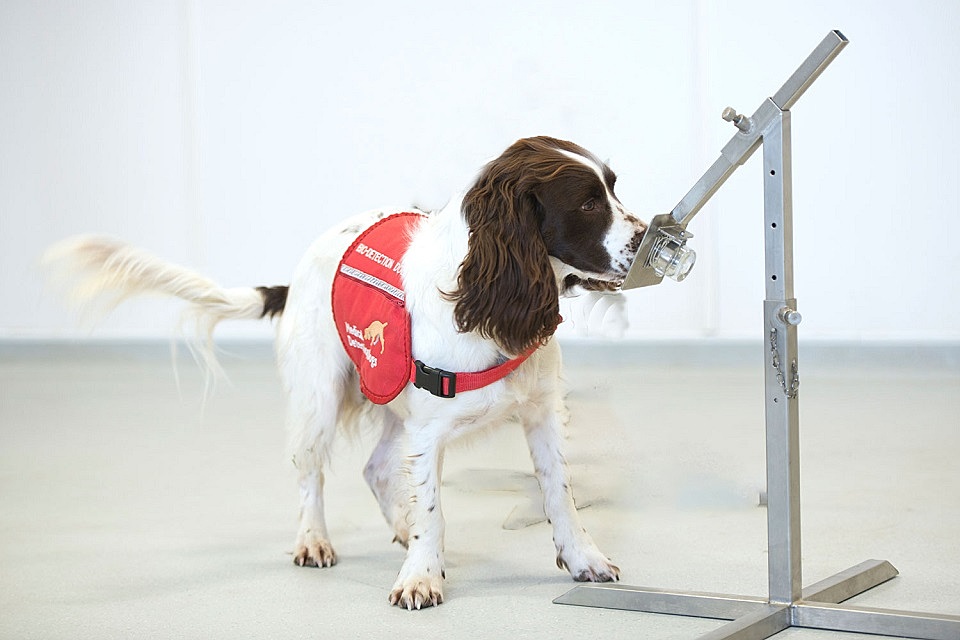
The dogs could provide a fast and non-invasive detection method
The Department of Health and Social care has announced trials for specially-trained ‘covid dogs’, that may be able to detect coronavirus in humans, even before symptoms appear, are set to begin as part of new research. This will establish whether they could be used as a potential new non-invasive, early warning measure to detect coronavirus in the future.
World-leading researchers at the London School of Hygiene & Tropical Medicine (LSHTM) will carry out the first phase of a trial in collaboration with the charity Medical Detection Dogs and Durham University, backed by £500,000 of government funding. This aims to determine whether dogs are able to detect coronavirus in humans from odour samples.
The trial brings together leading disease control experts from the universities with Medical Detection Dogs, who have already successfully trained dogs to detect the odour of many different diseases in humans, such as cancer, malaria and Parkinson’s disease.
This new trial will look at whether the dogs, a mixture of labradors and cocker spaniels, can be trained to detect coronavirus in people too, even if they are not showing symptoms.
Minister for Innovation Lord Bethell said:
“Bio-detection dogs already detect specific cancers and we believe this innovation might provide speedy results as part of our wider testing strategy. Accuracy is essential so this trial will tell us whether ‘COVID dogs’ can reliably detect the virus and stop it spreading.”
If successful, these dogs could provide a fast and non-invasive detection method alongside the government’s robust 5-pillar testing strategy. It is one of a number of testing measures being explored in order to ensure the government’s response to the virus is as extensive as possible.
The initial phase of the trial will see NHS staff in London hospitals collect odour samples from people who are infected with coronavirus and those who are uninfected. The 6 bio detection dogs will then undergo thorough training to identify the virus from the samples.
Source: www.gov.uk
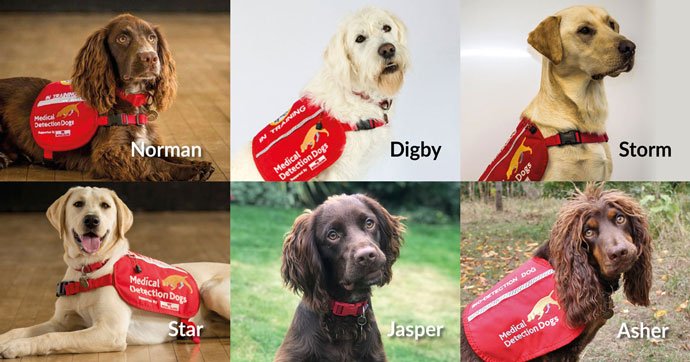
The dogs could each screen up to 250 people per hour
More than 10 years of research gathered by Medical Detection Dogs has shown that the dogs, which could each screen up to 250 people per hour, can be trained to detect the odour of disease at the equivalent dilution of one teaspoon of sugar in 2 Olympic-sized swimming pools of water.
Professor James Logan, lead researcher for the work and Head of the Department of Disease Control at the London School of Hygiene and Tropical Medicine, said:
“Our previous work has shown that malaria has a distinctive odour, and with Medical Detection Dogs, we successfully trained dogs to accurately detect malaria. This, combined with the knowledge that respiratory disease can change body odour, makes us hopeful that the dogs can also detect COVID-19.
I would like to thank the UK government for their support of this pioneering research through this funding. We’re excited to do this trial, and confirm whether these bio detection dogs can be used to screen for COVID-19.
If successful, this approach could revolutionise how we detect the virus, with the potential to screen high numbers of people.”
Source: www.gov.uk
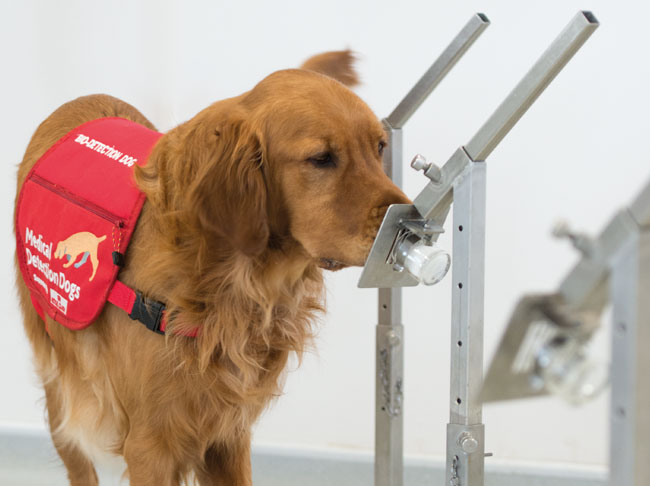
A dog’s nose could once again save many lives
Medical Detection Dogs and the universities put forward a proposal for the clinical trial to the government, which has been accepted following strong evidence that the dogs can detect other diseases in humans with a high level of accuracy.
The dogs will only be deployed if backed by strong scientific evidence and is part of the government’s approach to explore all possible options to tackle coronavirus.
Dr. Claire Guest, Co-founder and CEO of Medical Detection Dogs, said:
“We are delighted that the government has given us the opportunity to demonstrate that dogs can play a role in the fight against COVID-19. They have the potential to help by quickly screening people, which could be vital in the future
We have already demonstrated our expertise in canine disease detection by successfully training dogs to detect diseases like cancer, Parkinson’s and malaria, and we apply that same science to train life-saving Medical Alert Assistance Dogs to detect odour changes in individuals caused by their health condition.
We are sure our dogs will be able to find the odour of COVID-19 and we will then move into a second phase to test them in live situations, following which we hope to work with other agencies to train more dogs for deployment. We are incredibly proud that a dog’s nose could once again save many lives.”
Medical Detection Dogs is the world-leading organisation for research into canine olfactory diagnostics. They train dogs to detect the odour of disease with the aim of developing faster, more efficient and less invasive diagnostics that lead to better patient outcomes.
Source: www.gov.uk
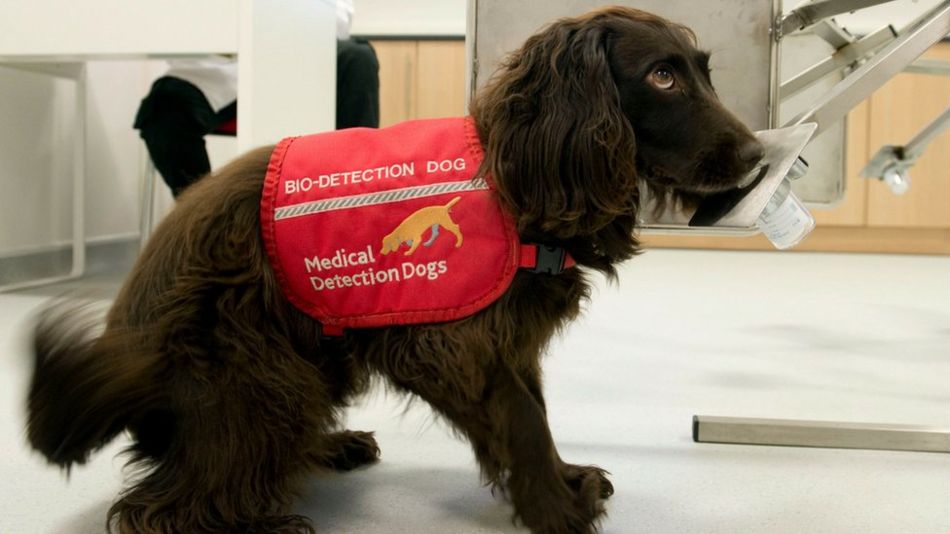
More about the trial and its objectives
This study, conducted by The London School Hygiene and Tropical Medicine (LSHTM) is built on the scientifically proven ability of dogs to act as great biosensors, capable of detecting odours associated with human health, as well as drugs, explosives and food.
For example, it has been scientifically proven that dogs can sense small changes in volatile organic compounds (VOCs), which can be produced by the human body when it is diseased. Dogs have already been trained to diagnose cancer in samples from patients, to alert people with diabetes that their blood sugar is low and detect many other diseases.
In a study published in the Lancet Infectious Diseases last year and funded by the Bill and Melinda Gates Foundation, our team of partners demonstrated that dogs can detect the presence of malaria in human odour with an effectiveness greater than 90%, even at an early stage of infection, which is above the World Health Organization’s standards for a diagnostic test. Importantly, the dogs can detect this in individuals who have no symptoms. The LSHTM is now furthering this method to be used on the ground in sub-Saharan Africa where malaria is of serious concern.
They hypothesise that dogs will also be able to detect VOCS in people who are infected with COVID-19. The research will involve training six available bio-detection dogs to distinguish between positive and negative odour samples, collected from up to 3,250 asymptomatic adults (who will be independently tested for COVID-19 infection). The LSHTM’S vision is to develop a fast, effective and non-invasive diagnostic, with the bio-detection dogs working to detect individuals infected with coronavirus at ports of entry and large gatherings.
Study objectives
The study objectives are:
- To rigorously test the method through an intensive training programme, and, if successful, to deploy dogs within 8-10 weeks after training.
- To work with other, experienced partners to scale-up operations rapidly for mass global mass testing during the current pandemic. Each dog can screen up to 250 people hourly.
- To place dogs in service at airports and other ports of entry to detect infected travellers, and for community surveys in countries worldwide.
Source: lshtm.ac.uk
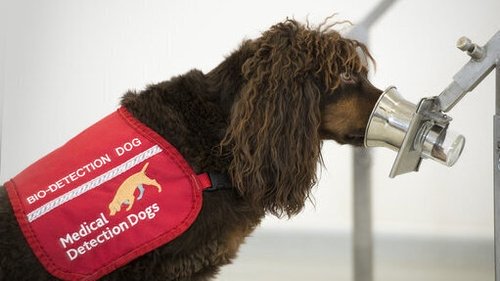
The implications of this study
On the London School of Hygiene and Tropical Medicine website, it explains:
This study could have a profound impact on how quickly we return to normality. Once we have demonstrated that our initial set of six trained dogs are capable of reliably identifying people infected with the coronavirus as, this non-invasive testing approach can then be scaled up significantly and rapidly.
Several trained dogs would be able to screen thousands of travellers each day at airports, identifying individuals who may require an additional test for confirmation or advised to self-isolate. This would allow the UK to further re-open its borders to international travel, with authorities confident that asymptomatic passengers can be quickly and effectively identified on arrival.
There is also potential for trained dogs to be used to screen commuters at travel hubs, visitors at museums, theatres, cinemas and sporting venues, which could the entertainment sector. And just as importantly, a fast, effective and non-invasive COVID-19 diagnostic tool would ensure other more limited healthcare testing resources are used where they are truly needed.
Ultimately, we intend to scale up operations on a global scale, by working with dog training agencies, and the military and police forces, to deploy dogs in as many countries as possible. We are already in discussion with local governments and border agencies in several countries regarding this.
Source: lshtm.ac.uk
